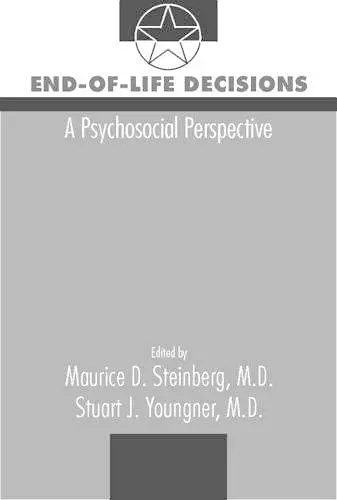End-of-Life Decisions
A Psychosocial Perspective
Stuart J Youngner editor Maurice D Steinberg editor
Format:Hardback
Publisher:American Psychiatric Association Publishing
Published:30th Sep '98
Currently unavailable, and unfortunately no date known when it will be back

Drs. Steinberg and Youngner have put together a collection of thoughtful and thorough essays on psychosocial and ethical aspects of end-of-life decisions. This book fills a gap in the growing literature on end-of-life decisions, covering everything from depressed patients to the role of the family to physician-assisted suicide. Contributors present actual cases from their own clinical experience, enriching a volume that is both highly readable and informative. I recommend it highly. Ruth Macklin, Ph.D., Professor of Bioethics, Department of Epidemiology and Social Medicine, Albert Einstein College of Medicine, Bronx, New York This timely volume is written by a panel of experts which draws heavily on consultation-liaison psychiatrists who are experienced and knowledgeable about end-of-life decisions. It includes chapters dealing with the legal and ethical issues by outstanding ethicists and a lawyer. Steinberg and Youngner have put together this most valuable book which will serve equally to educate professionals in mental health and medicine. The psychosocial perspective must receive increased attention if we are to provide the most rational, thoughtful, and effective care for patients and give help to the families who must share in the burden of decisions. This book summarizes the psychosocial perspective on care at the end of life -- it makes a unique contribution to the literature. Jimmie Holland, M.D., Chair, Department of Psychiatry & Behavioral Sciences, Memorial Sloan-Kettering Cancer Center, Professor and Vice-Chair, Department of Psychiatry, Cornell Univ Medical College
The book acknowledges and explores the role psychiatrists can play as advisers to the terminally ill and their loved ones. It describes the wide range of emotional and psychiatric issues faced by the patient, family, and physician that affect choices patients make to limit treatment or seek physician assistance in dying.
In recent years, the lens of the media has narrowed issues of euthanasia and assisted suicide to a drama involving two players: Dr. Kevorkian and the law. This has left suffering patients and their families unrecognized and isolated when facing the most painful life decision.
Here at last is a book that addresses the role of psychiatry in dealing with a major, controversial topic in American medicine today—treatment decisions at the end of life. End-of-Life Decisions: A Psychosocial Perspective acknowledges and explores the role psychiatrists can play as advisers to the terminally ill and their loved ones. It describes the wide range of emotional and psychiatric issues faced by the patient, family, and physician that affect choices patients make to limit treatment or seek physician assistance in dying.
A distinguished group of contributors, all of whom have extensive experience dealing with end-of-life issues in clinical practice, address topics that may not have been considered previously. From dealing with issues of terminal illnesses in children, to making difficult treatment decisions for patients with AIDS; from judging the competency of clinically depressed patients for making sound decisions, to understanding the influence of family dynamics, economic forces, and language differences on doctor-patient communication—the book uses specific case studies and data to explore the role of professionals in end-of-life decisions.
End-of-Life Decisions strikes a careful balance between the need for patient autonomy and the challenge to make well-formulated treatment decisions. This book will heighten modern medicine's and society's consciousness concerning the difficult challenges faced by patients and their families when making end-of-life decisions
Medical and mental health professionals will find this book useful in analyzing issues surrounding psychiatric contributions in end-of-life decision making. Ethicists will benefit from chapters on psychosocial dynamics as adding necessary clinical sophistication to their theoretical considerations of this important topic.
* Religious Studies Review *This book is a good introduction for the psychiatrist who wishes to work with terminally ill patients in a palliative care setting, but who has not had significant clinical experience working with this special population.
* Doody's Health Sciences Book Review JournISBN: 9780880487566
Dimensions: 229mm x 152mm x 25mm
Weight: 635g
344 pages